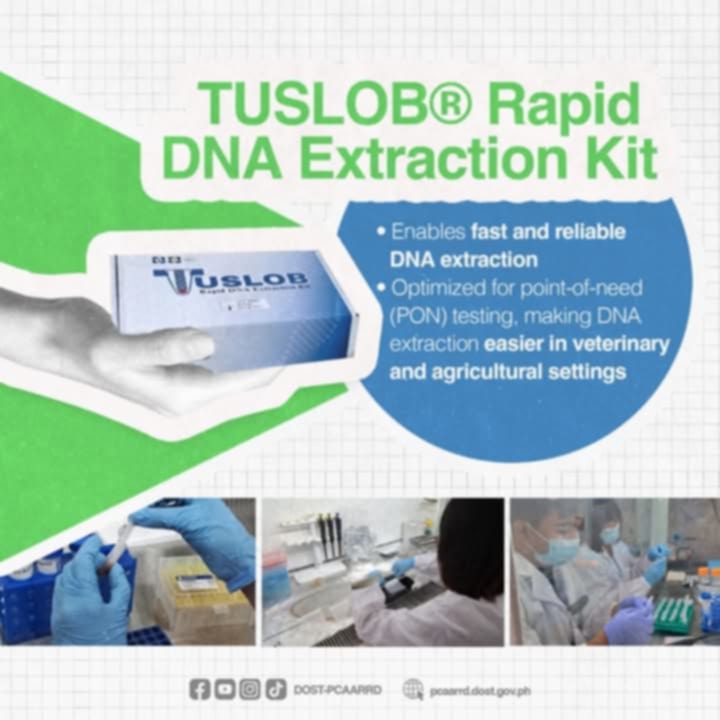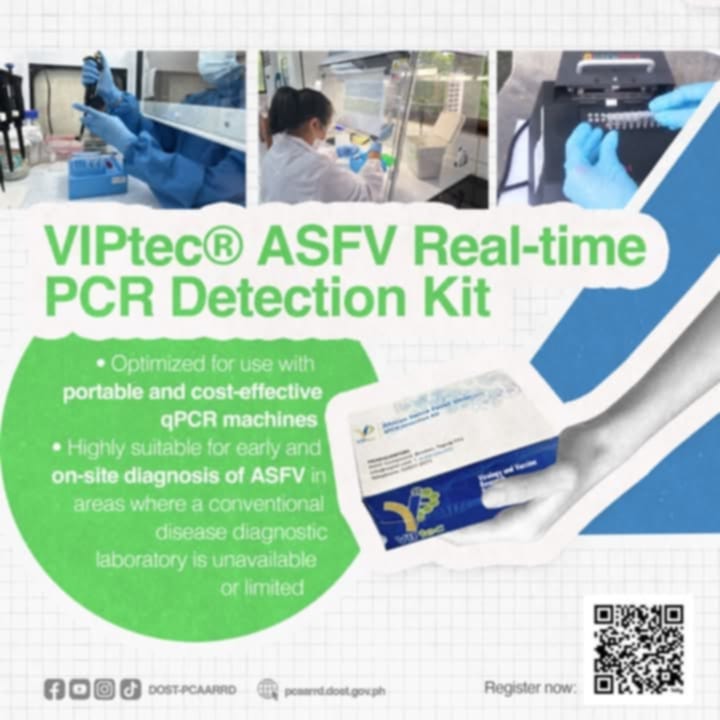By Perfecto T. Raymundo, Jr.
IBIS STYLES MANILA ARANETA CITY – The Department of Science and Technology (DOST), together with BioAssets Corporation, has leveraged science, technology and innovation (STI) to develop three technologies to detect and manage African Swine Fever (ASF) virus.
In the PigUsapan Technology to People Agham, Teknolohiya, at Inobasyon Laban sa African Swine Fever (ASF) on Monday (July 28), DOST Secretary Dr. Renato U. Solidum, Jr. said that the DA (Department of Agriculture) has reported a 25% increase in pig imports in May 2025.

Dr. Solidum noted that the ASF has continuously wrecked havoc in the hog industry.
“ASF, a causative agent of hemorrhagic fever in pigs, has continuously devastated the swine industry in the Philippines, ASF outbreaks have occurred in 76 out of 82 provinces since 2019, with four provinces having active cases as of May 9, 2025,” Solidum said.
“As a government agency committed to advancing STI, DOST has continuously backed research initiative focusing on diagnostics and vaccine development for animal infectious diseases such as ASF,” he added.
“These three technologies delve into the potential of STI to address critical issues in animal health, especially regarding ASF. These highlight how STI can contribute holistic solutions to pressing animal health challenges that impact our food security,” Solidum said.
Solidum cited the two developed technologies to detect ASF such as the “TUSLOB Rapid DNA Extraction Kit” and “VIPtec African Swine Fever Virus (ASFV) Real-time PCR Detection Kit”.
“We have onsite and sampling analysIs,” Solidum said.
These two detection kits are meant to be used subsequently.
The project is under the Virology and Vaccine Research Program (VRP) funded by DOST and monitored by the DOST-Philippine Council for Agriculture, Aquatic and Natural Resources Research and Development (DOST-PCAARRD).
Solidum also said that the third technology is the first Filipino-made “Mobile Biocontainment Laboratory (MBL)” developed by BioAssets Corp.
“Ang kagandahan nito ay pwedeng umikot saan-saan (The good thing is that it can go anywhere),” Solidum said.
The MBL was intended to support rapid response to potential outbreaks and improve capacity building and disease surveillance that would enable farmers and veterinarians to craft mitigation strategies, preventive and control measures at the point-of-need.
“Napakaimportante na maipakita sa Fililpino ang mga ginagawa natin para sa food security,” Solidum said.
Secretary Solidum congratulated DOST-PCAARRD Executive Director Dr. Rey Ebora for spearheading the press conference which he termed as “Pest Conference”.
“We are committed to deliver science, technology, and innovation to Filipinos aside from food security, sustainable technology and health resiliency,” Solidum said.
Also present were DOST Undersecretary for Research and Development Dr. Lea J. Buendia, DOST-PCAARRD Executive Director Dr. Reynaldo V. Ebora, DOST-ITDI Executive Director Dr. Annabel Briones, BioAssets Corp. Business Linkages Manager Shervi M. Encabo, among others.
For a rapid detection of the ASFV, the DOST-Industrial Technology Development Institute (DOST-ITDI) has developed two technologies that use a rapid, accurate, and real-time Polymerase Chain Reaction (PCR) protocol applicable for point-of-need detection of ASF.
The PCR is a laboratory technique used for amplifying multiple copies of a target DNA segment from a sample.
It involves single-stranded DNA fragments called primers that complement the target DNA segment for multiple gene amplification.
John Paulo G. Jose, Science Research Specialist II of the DOST-ITDI, tackled the “TUSLOB Rapid DNA Extraction Kit” and “VIPtec African Swine Fever Virus (ASFV) Real-time PCR Detection Kit”.
The two technologies are flagship projects of the DOST and the proposed legislative measure establishing the Philippine Virology and Vaccine Research Institute is set to be ratified by the Senate.
“ASF hits hard and hits fast. ASF is global and so is science. As of July 2025, ASF is present in four regions in the country, six provinces, 12 municipalities and 28 barangays,” Jose said.
ASF is not only a science problem but a national problem. The control and prevention of which, involves the LGU engagement, surveillance, biosecurity, and capability awareness.
The TUSLOB Rapid DNA Extraction Kit does not need a laboratory and only uses a dipstick capable of capturing and retaining DNA from biological samples such as blood, the results of which can be obtained in less than 10 minutes.
The VIPtec African Swine Fever Virus (ASFV) Real-time PCR Detection Kit is specifically designed to detect ASF accurately and timely. It’s designed for onsite testing. It’s ready to use anytime, anywhere. The results of which come out in 1.5 hours.
“This is not just a science project – it’s a shared mission,” Jose said.
Encabo said that they really feel the problem of the hog industry if the results of the ASF turn positive.
BioAssets Corporation is a pioneer in the animal industry in the field of diagnostics, contract research, point-of-need diagnostics and it’s based in Sto. Tomas, Batangas.
“Prevention is always better than cure,” Encabo said. He added that they are supporting the DOST’s proactive and preventive approach in the animal industry.
They are conducting seminars with health partners with the support of the United States government.
“We surely believe that we and the industry cannot do this alone,” Encabo said, adding that, “We continuously search for vaccines.”
They have had MOA (Memorandum of Agreement) signing with deans of universities on research and development in collaboration with the DOST.
“The mobile lab can be done through public and private partnership,” Encabo said.
In the media forum, Solidum said that overall budget for this research project since 2022, there are PHP30 million grant-in-aid and PHP16 million for incubation of the project, excluding the budget of the DA.
Solidum added that they started the project in 2019 with 76 provinces affected by ASF and now only four provinces are affected.
“Ang BioAssets ay tinulungan namin sa reseach pa lang. They are continuously researching on vaccines. BioAssets is a local R&D. We are helping them to develop a vaccine to address ASF,” Solidum said.
“When it comes to operation, it’s the DA. Our mandate is only on research,” he added.
Solidum said that they are now on the second year of the PHP100-million research for five years to develop vaccines to address ASF.
“We are precisely doing this for ASF detection is in the area onsite. This effort is not only focused on the pig industry. Our effort in ensuring food security is not only on ASF, but also on plant and animals,” Solidum said.
“We have focused on many innovations and interventions and hope that these will continue. We really don’t know what is on the report,” Solidum said on what to be expected in the fourth SONA of President Ferdinand R. Marcos, Jr.
“If a researcher needs funding to refine their product development, we provide funding,” Solidum said.
Solidum added that they wanted the health products to pass through the certification of the FDA (Food and Drugs Administration).
“We support all the laboratories, especially the regional laboratories. We will support the establishment of standards and calibration,” Solidum said.
“We really anticipate what will happen in the future in humans, animals and plants with the establishment of the Philippine Virology and Vaccine Research Institute,” he added.
Dr. Ebora said that they are validating the impact of the ASF in the pig industry and they have no data as of today.
He added that the disease can be easily managed if it is detected and prevented earlier. “it is an effort of the government plus the various sectors,” Dr. Ebora said.
“Technology transfer and commercialization, which needs validation, are two different things that need focus and attention,” he added.
He cited the development of biofertilizer to increase the corn output, but the production of soy beans to decrease the cost, is not yet promising or feasible.
The DOST-PCAARRD is encouraging the cooperatives to get involved in commercialization. It is also focused on addressing the infestation in the coconut industry.
It is also developing kits focused on ASF, the diagnostics of which, can also be applied to other animal diseases.
“Every development of a technology consists of phases such as in the laboratory, in the field and variations whether false positive or false negative. There are mechanisms to redefine the methodologies,” Dr. Ebora said.
It is interesting to note that Marinduque and Benguet provinces were not bit by ASF.
Jose said that TUSLOB and VIPtec are still in the finalization stage and the initial projection is that it will cost PHP300 to PHP1,000 per kit.
Dr. Briones said that the initial talks is with BioAssets, and Manila Healthtech, which was supported by the DOST during the Covid-19 pandemic which hit the Philippines on March 15, 2020 until December 2022.
Usec. Buendia said that they are funding much on R&D and they are coming up with ASF vaccine that is imported and other surveillance mechanisms that the DA is also doing. ###







